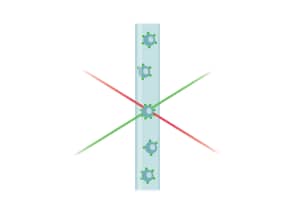Breadcrumb
- Home
- Products
- Macrophage Differentiation Kits
- Macrophage Differentiation Kits Cell Culture Products
- CellXVivo Human M2 Macrophage Differentiation Kit (CDK013)
CellXVivo Human M2 Macrophage Differentiation Kit
R&D Systems, part of Bio-Techne | Catalog # CDK013

Key Product Details
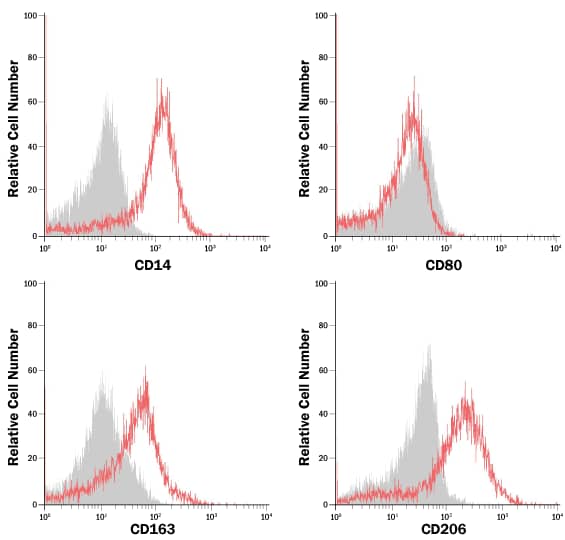
Summary for CellXVivo Human M2 Macrophage Differentiation Kit
For the differentiation of human CD14+ monocytes into M2 macrophages
Key Benefits
- Provides optimized reagents needed to induce M2 macrophage differentiation from human CD14+ monocytes
- M2 macrophages have a CD14+ CD80- CD163+ CD206+ phenotype
- Utilizes validated and straightforward procedures
- Does not require specialized instrumentation
Why Generate M1 and M2 Macrophages from CD14+ Monocytes Ex Vivo?
Macrophages derived from circulating inflammatory or resident monocytes are recruited to areas of tissue inflammation in response to injury or pathogenic insult. M1 macrophages produce pro-inflammatory cytokines that combat pathogenic infection and reduce the infectivity of microbes. Prolonged or excessive activation of M1 macrophages can result in secondary damage to host tissue. M2 macrophages produce growth factors and anti-inflammatory cytokines to suppress the host immune response, promote wound healing and tissue remodeling, and improve metabolic and endocrine signaling within tissues. Harvesting CD14+ monocytes from peripheral blood mononuclear cells and driving their differentiation ex vivo can provide an abundant source of M1 or M2 macrophages for downstream research studies.
This kit contains the following optimized reagents for the differentiation of human monocytes into M2 macrophages
- Serum-Free Base Media
- Recombinant Human M-CSF
- Reconstitution Buffer 2
- Provides sufficient reagents for the differentiation of two 24-well plates or 5 x 107 cells.
Stability and Storage
Store the unopened kit at ≤ -20 °C. Do not use past the kit expiration date. Opened or reconstituted Serum-Free Base Media and Recombinant Human M-CSF should be stored at 2-8 °C under sterile conditions for up to 30 days or at -20 °C to -70 °C in a manual defrost freezer for up to 3 months.* Opened Reconstitution Buffer 2 should be stored at 2-8 °C under sterile conditions for up to 3 months.*
*Provided this is within the expiration date of the kit.
| Species | Human |
| Source | N/A |

|
Phenotypic Analysis of Human M2 Macrophages. Flow cytometry data show cell surface marker expression of human peripheral blood CD14+monocytes following differentiation using reagents included in the CellXVivo™ Human M2 Macrophage Differentiation Kit. On day 6 of the differentiation, cells were harvested and stained with antibodies for CD14, CD80, CD163, and CD206 (open histograms). Cell staining was gated using isotype control antibodies (filled histograms). M2 macrophages display a CD14+CD80-CD163+CD206+phenotype. |
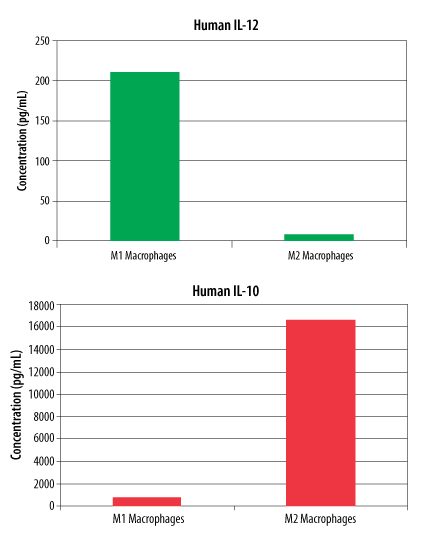
|
Differentiated Human M2 Macrophages Secrete IL-10. Human peripheral blood CD14+monocytes were differentiated for 6 days under M1 or M2 macrophage polarization conditions using reagents included in the CellXVivo™ Human M1 Differentiation Kit (Catalog # CDK012) or the CellXVivo™ M2 Macrophage Differentiation Kit. On day 6, M1 and M2 macrophages were stimulated with 1 µg/mL LPS for 24 hours. Cell culture supernatant was collected and cytokine secretion was determined using the Human IL-12 p70 Quantikine®HS ELISA Kit (Catalog # HS120) and the Human IL-10 Quantikine®ELISA Kit (Catalog # D1000B). |

|
Optimized Base Media in CellXVivo™ Macrophage Differentiation Kits Results in More Efficient Differentiation of M1 and M2 Macrophages. The Serum-free Base Media included in the CellXVivo™M1 and M2 Macrophage Differentiation Kits (Catalog # CDK012 and Catalog # CDK013) was screened against other commercially available base media (Competitor 1, Competitor 2) for its ability to promote M1 and M2 differentiation. Human peripheral blood CD14+monocytes were cultured in either Serum-free Base Media from the CellXVivo™Macrophage Differentiation Kits, Competitor Media 1, or Competitor Media 2. M1 and M2 macrophage differentiation was performed in each of the base media with cytokines from the CellXVivo™M1 and M2 Macrophage Kits added to each media condition in parallel. Following the differentiation protocol, M1 and M2 macrophages from each media condition were stimulated with 1 µg/mL LPS for 24 hours. Cell culture supernatants were assessed for IL-10 and IL-12 secretion using Human IL-12 p70 and Human IL-10 Quantikine®ELISA Kits (Catalog # HS120and Catalog # D100B, respectively). These data indicate that monocytes differentiated using the Serum-free Base Media included in the CellXVivo™Macrophage Differentiation Kits produce more efficient and pure populations of the desired M1 or M2 phenotype. Competitor base media resulted in either a mixed M1/M2 population (Competitor 1) or lower levels of cytokine secretion (Competitor 2). |
Preparation & Storage
| Shipping Conditions | The product is shipped with dry ice or equivalent. Upon receipt, store it immediately at the temperature recommended below. |
| Storage | Store the unopened product at -20 to -70 °C. Use a manual defrost freezer and avoid repeated freeze-thaw cycles. Do not use past expiration date. |
Assay Procedure
Refer to the product datasheet for complete product details.
Briefly, M2 macrophages can be generated from human monocytes using the following procedure:
- Isolate human CD14+ monocytes from a PBMC preparation
- Culture CD14+ monocytes in M2 Macrophage Differentiation Media
- Verify differentiation into M2 macrophages by flow cytometry
- Verify differentiation into by ELISA detection of IL-10
Reagents Supplied in the CellXVivo™ Human M2 Macrophage Differentiation Kit (Catalog # CDK013):
- Serum-Free Base Media
- Recombinant Human M-CSF
- Reconstitution Buffer 2
Reagents
- MagCellect™ Human CD14+ Cell Isolation Kit (R&D Systems, Catalog # MAGH105, or equivalent).
- Ficoll-Hypaque™
- Penicillin (optional)
- Streptomycin (optional)
- Cell Dissociation Solution Non-enzymatic 1x (Sigma)
- Lipopolysaccaride (LPS) (optional)
Equipment
- Tissue culture flasks and/or plates
- Inverted microscope
- Hemocytometer
- 37 °C and 5% CO2 humidified cell culture incubator
- Centrifuge
- Pipettes and pipette tips
Isolate PBMCs from human blood.
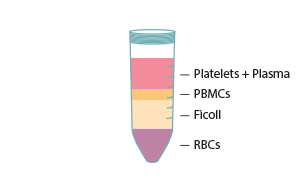
Enrich human CD14+ monocytes from PBMCs (e.g., using magnetic cell selection).
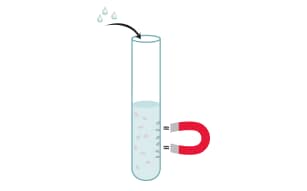
Perform a cell count.

Suspend 2 x 106 cells/mL in Human M2 Macrophage Differentiation Media.
Culture the cells on plates for 6 days.
Add fresh Human M2 Macrophage Differentiation Media on day 3.

Verify M2 macrophage differentiation on day 6 by analyzing cell surface marker expression via flow cytometry.
M2 macrophages are ready for downstream application.
